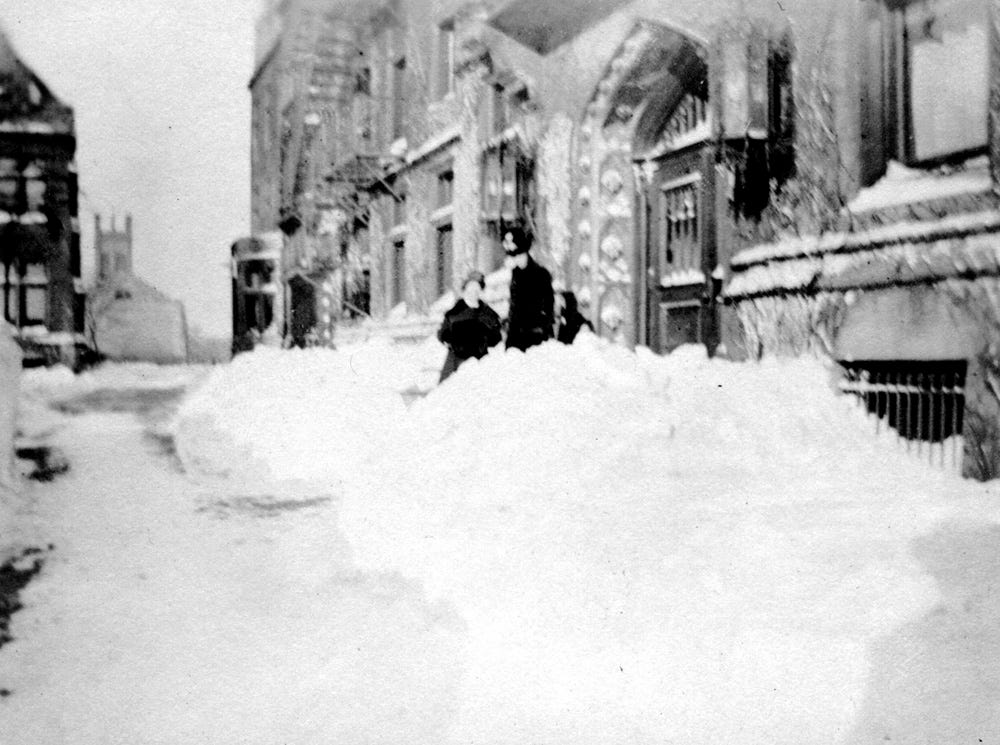Martin Luther King, Jr. Day
Last year, I wrote about Dr. King's deep intense connection with the civil rights battles in Chicago and Hyde Park. It seems worth revisiting. The arc of the universe may bend toward justice, but people have had to work hard to bring that about. https://www.hpherald.com/evening_digest/hyde-park-stories-dr-martin-luther-king-jr/article_68b93b22-b3d7-11ee-8a21-f37c0f7d482e.html
Polar Vortex
As Chicago this week gets its taste of Canadian weather (it’s 0 degrees as I write this), at least it’s not a winter of Big Snows. Many Hyde Parkers remember the Big Snow of 1967. I lived through the Big Snow of 1979—which brought down Mayor Bilandic and paved the way for the best mayor of my lifetime, Hyde Park’s own Harold Washington.
There were earlier Big Snows, particularly in January 1918. It swept across the whole Midwest with days of snowfall and howling winds. Trains couldn’t move, so there was soon a coal shortage as the temperatures plummeted below zero Fahrenheit. The only thing moving in the city was the cable car system, which had giant electrical power plows and a 1,250 man shovel brigade. With the streets blocked, the city worried about getting fire equipment through and coal and food deliveries. The only things doing a great business were the downtown theaters. People trapped in the downtown hotels kept them busy. As with the later Big Snows, the 10 foot drifts and subzero temperatures overwhelmed the standard systems, and the powers that be begged everyone to pitch in.
Judge Kennesaw Mountain Landis—yes, the first commissioner of organized baseball—was living in the Windermere Hotel, the one later known as Windermere West, built for the 1893 World’s Fair. He organized 50 of the male guests of the Windermere to dig out Stony Island, 56th Street, and half of Cornell. When the manager of the hotel saw their efforts were flagging, he ran out with hot coffee to keep them going.
Women pitched in. As someone who was raised by parents used to rural life, I saw nothing unusual in being asked to shovel. I was out with a big coal shovel myself when I was still in grade school, but apparently women shoveling snow was seen as quite the feminist victory in 1918. The Tribune of January 14, 1918, had this to say about women and girls digging out their blocks at Dorchester and Blackstone near 67th Street:
“Who said Woman they name is frailty. Old stuff. We give you, messieurs, the Battalion of Death on snowdrifts. They turned out yesterday under command of Captainess Ressie Woollatt of 1423 East 67th Place and directed their embattled spades and shovels against the enemy that had accumulated between Dorchester and Blackstone on East 67th Place. He was routed on all fronts. Not only did they make the world safe for footocracy, but they rescued a fireplug that had been lost for several days. They wore bloomers as well as trousers. Among those who went over the top in snow man’s land were Mrs. William Lovell, Mrs. B. F. Fisher…”
That must in part be the reason why someone wanted to record the women students of the University of Chicago hard at work with their shovels. There’s a whole series in the archive.
Here are the formidable founders of women’s education at the University of Chicago, standing in the snowdrift in the bitter cold. The caption identifies them as Marion Talbot and Sophonisba Breckenridge.

Shoveling out was a formidable task as the next photo in the series shows.
The women who lived in the three buildings, Foster, Kelly, and Green dug out their walks so they could get to classes. They also cleared University Avenue. That’s Mitchell Tower on 57th Street in the background. They seem to have dug out at least two city blocks (1/4 of a mile) plus the walks on campus.
They do look very pleased with themselves.
Chicago is a Summer Paradise!
As you shiver through the January weather, remember that Chicago will once more be a summer paradise in a few short months.
As the text says, "The conveniences, diversions, and transportation facilities of the West’s greatest metropolis combined with famous lake breezes, miles of bathing beaches, palatial hotels, make Chicago the mecca of thousands of tourists and recreation hunters seeking the perfect summer resort."








